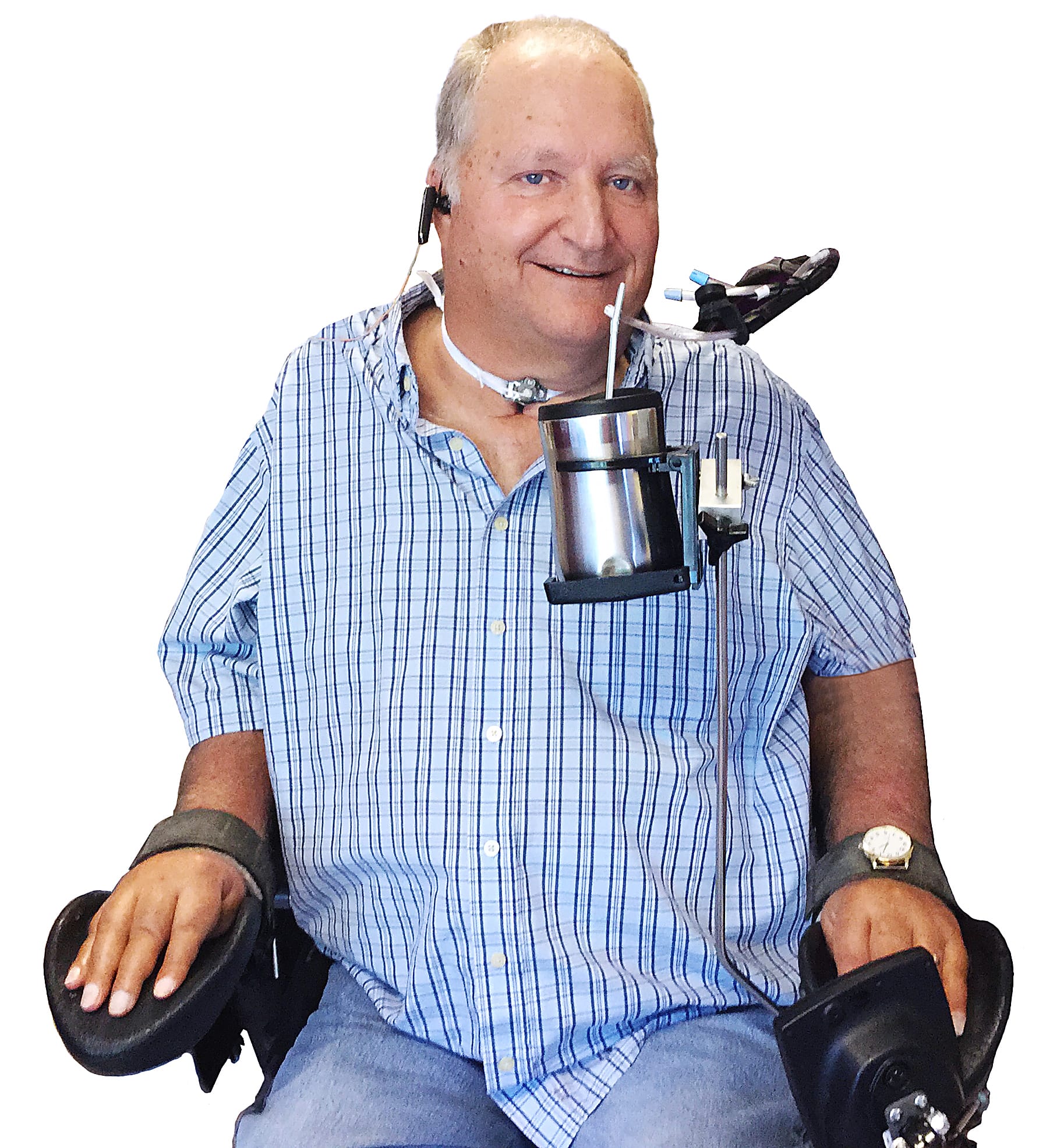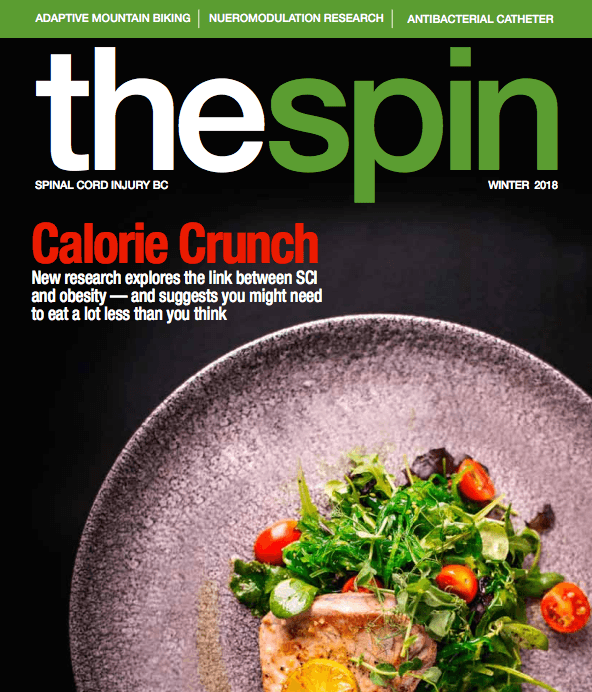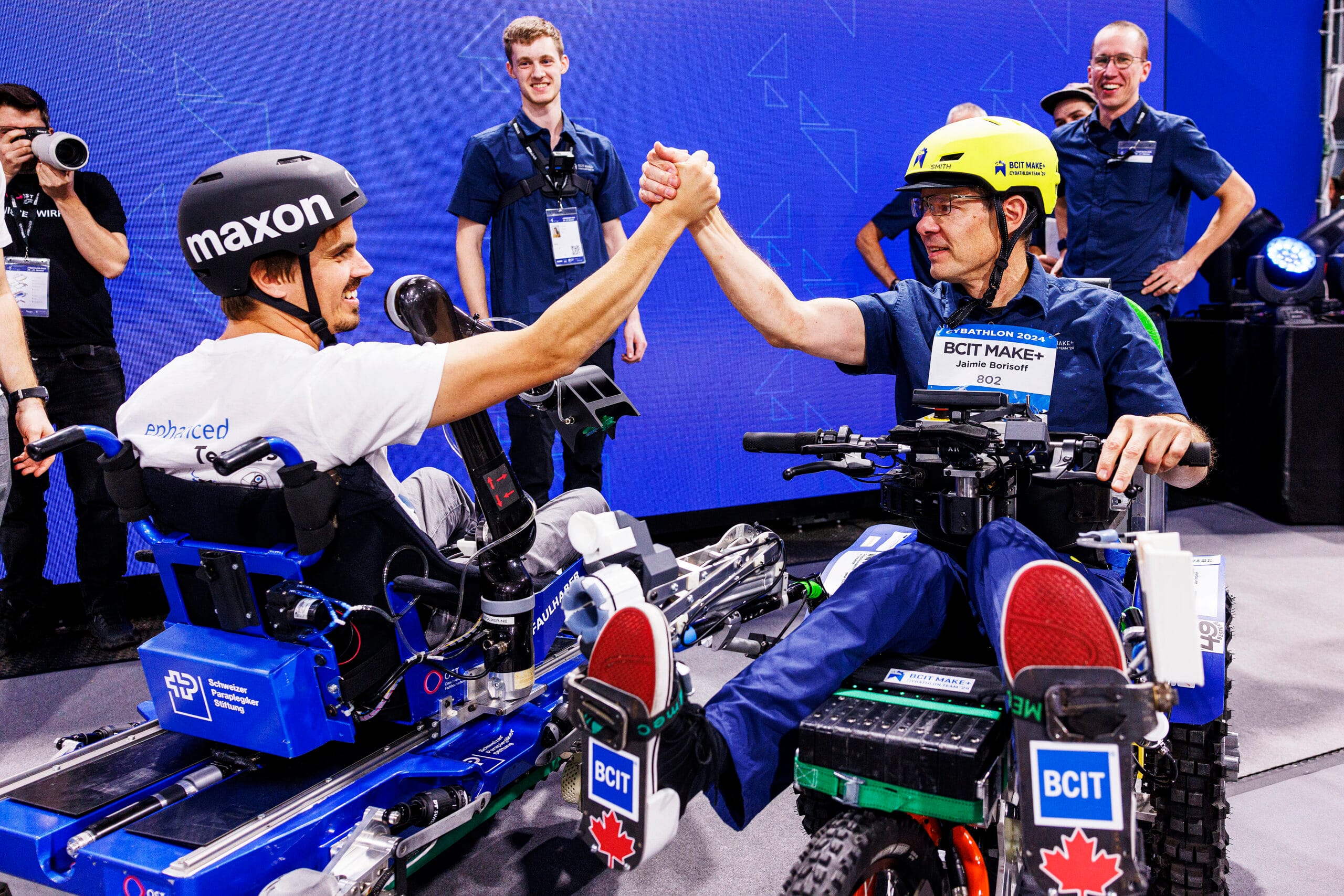Walt Lawrence has lived a remarkably long and healthy life for someone with C2-C3 quadriplegia who is dependent on a ventilator. That’s given him the opportunity to make a remarkably generous contribution to BC’s SCI community—and he’s far from finished.

Walt Lawrence is a Peer counsellor who has plied his trade at GF Strong for three decades. This summer, Lawrence celebrated the half century anniversary of his own SCI.
As a high level quadriplegic who still relies partially on a ventilator, Lawrence has defied the odds and avoided the many serious and even deadly health challenges that go hand-in-hand with high level injuries such as his. Along the way, he has worked tirelessly to help other people with SCI regain hope and independence—something he has no plans of stopping despite the fact that, at the age of 67, he’s past the age when most able-bodied people have retired.
Lawrence’s life with SCI began in the summer of 1968. At the time, he was a talented 17-year-old hockey player and pilot who had grown up in Dawson Creek. En route to hockey practice with his team in Kelowna, he stopped for a swim in Okanagan Lake. An innocent dive into shallow water changed everything in a split second.
A pivotal point in Lawrence’s life came in 1985, when he joined several fellow quadriplegics and moved into semi-independent living at the newly constructed Creekside development—an innovative housing cooperative championed by SCI BC’s Doug Mowat.
Lawrence flourished in his new surroundings. He got engaged to his future wife Wendy while residing there, and also enrolled in a two year course in counselling that would eventually lead him to his position of Vancouver Coast Health peer counsellor.
He lived at Creekside until he and Wendy married and moved into their own home. Shortly after, the couple adopted two baby daughters.
While much has changed over the years, one thing that hasn’t is Lawrence’s steady presence at GF Strong, where he uses his unique combination of life experience and counselling expertise to help others adjust to life after SCI.
Recently, we asked him a few questions about his amazing life and career.
What do you credit for your longevity and health?
I’d have to say family and friends. They bring meaning to life when you feel you’ve lost it. I think I was fortunate in the early years after my injury, when I thought I’d lost everything, my family was there for me.
Also, I think it’s that we have an inherent desire to contribute, and when you find a way to do that, I think it brings health; it brings meaning. If we don’t have meaning in life, then we physically and mentally go downhill.
You’ve made an impact in the lives of so many SCI BC Peers. What’s the most important thing you think you’ve been able to do for these Peers during the time you had to spend with them?
What do I bring to counselling? I have my counselling papers. But what is it I really bring? It’s my injury. I lived it. It’s the thing I hated most— my injury. Now I see it as my biggest gift.
After you get injured, it’s pretty shitty. It’s an upside-down world. And it does feel like a deep, dark pit. All the things that cause the highest anxiety—they hit you all at once. Following my own injury, I thought, “What do I have to contribute? I’m a pilot…but can’t fly. I’m a hockey player…but I can’t play hockey.” My body meant everything to me when I was 18. I’d lost everything that equated to value to me in those early days. So it was all about revaluing.
I want to walk with other people through that. In my counselling, I never want to downplay the darkness they’re going through; I want to walk through that with them. I always have the underlying belief there’s a rich life ahead for them.
How does it make you feel to see and hear the expressions of gratitude that have been coming from many of the people you’ve helped?
It’s very touching. I think the most important goal we can have in life is to assist other people. It’s to be lending some meaning, giving people a hand, caring for them when they don’t feel cared for.
As a counsellor, you never really know how you’re doing. So it’s incredible to hear and see these words. What an opportunity I’ve had. When I first got injured, I would have given anything to be someone else. Now I wouldn’t. I’d be a hypocrite if I said I didn’t still want to walk, but I wouldn’t trade my life for anything.
How long will you keep working? Does the job still give you the same satisfaction and joy?
Absolutely! I’m so fortunate to have this job for 30 years and still love what I do. I think I can mentor people, if even for a short time. My whole goal is to let people know they’re still of infinite value, instead of feeling like they’re a throwaway piece of the puzzle.
I think about this young guy I met back in 1968, Lester Watson. He was 21 years old, and had polio when he was four. But he wasn’t about his disability at all. He was all about life. He was a huge mentor to me. Over the years, I asked him, “Les, do you realize the impact you had in my life?” And he would say, “Nope.” And that’s the way I think it is in life—people don’t realize they have an effect on others, every day. It can be positive, or it can be negative. It can build, or it can tear down.
Why would I think about retiring? I think my best years are ahead of me. Again, we have an inherent need to contribute. That’s the way I know how to contribute. I could make money, but this feels very fulfilling. It’s so fulfilling to help people move forward through their dark time.
Anything else you’d care to add, keeping in mind the majority of our readers are your peers, and some of them might be reading this while in rehab?
This comes from my underlying faith: you’re of infinite value, even though you sometimes don’t feel like it. You’re not a throwaway. You can contribute. At first you might feel like you’re dependent on everyone around you. And you are. But in that puzzle, they’re dependent on you, too. Never forget that. Never forget you’re of value even though you can’t see it. Life is a big adventure.
Also, I’ll repeat some great thoughts from a friend, Terry Forster, who has since passed away. He told me, “I think the biggest thing during preparing someone for discharge is not teaching them where they can get their chair fixed or get supplies. Instead, it’s make sure you don’t hide yourself behind the computer and the TV and avoid your community.”
So the message is to get out there. Otherwise, you’ll whither away.
 This article first appeared in our Winter 2018 issue of The Spin, alongside other stories including:
This article first appeared in our Winter 2018 issue of The Spin, alongside other stories including:
- It’s All Downhill From Here: aMTB
- Calorie Crunch: Obesity and SCI
- Moving Matters
- and more!
Read the full Winter 2018 issue of The Spin online!Have an idea for a future issue of The Spin? Pitch your idea to thespin@sci-bc.ca!



